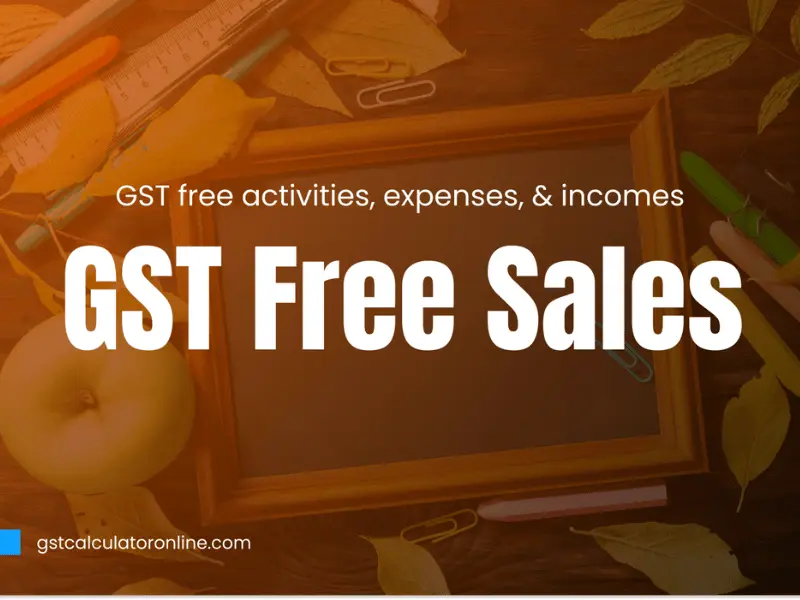GST Free Supplies: How it Affects Your Small Business

In today’s competitive business environment, understanding how different tax regulations impact your small business is essential. The good news for you is that certain items and transactions are considered GST free supplies, which means you don’t have to pay Goods and Services Tax (GST) on them. But how does this work, and which items are exempt?
Stay with us; we’ll walk you through the important aspects of GST-free supplies in Australia, touching on their impact on small businesses. Along the way, we’ll provide examples, discuss the GST-free threshold, and delve into various activities, expenses, and incomes that come under GST-free categories.
GST Free Supplies
Before diving into GST-free supplies, it’s important to understand the difference between GST-free items and taxable supplies. Taxable supplies are items on which GST is applied at a rate of 10%, which customers must pay when making a purchase.
Now, let’s dive into the core of our topic. GST-free supplies are specific goods and services that are exempt from the standard 10% GST charge. This means that when you purchase or consume these items, you won’t have to bear the additional cost of GST. Sounds like a great relief.
Read more about:
GST free Items & Services Examples
Goods and services that are exempt from GST span across multiple sectors. Some common examples include:
Keep in mind that this list is not exhaustive. Always consult the Australian Tax Office for the official and up-to-date list.
GST Threshold for Small Business
The GST-free threshold in Australia significantly impacts small businesses. Under the current legislation, businesses earning under AUD 75,000 annually are not obligated to register for GST. This exemption provides financial relief by reducing tax-related administrative burdens, enabling these businesses to focus on growth and innovation. However, it’s important to note that once a business crosses this threshold, it’s a legal requirement to register for and pay GST.
Read more:
Why should I care?
You might be wondering – “why would anyone be interested in something so dull?” Well, it turns out that understanding what qualifies as a GST-free supply can help you save money as a savvy consumer and possibly even supercharge your business!
For Customer
Imagine buying certain products or services without being charged the 10% GST? This exemption could save you a pretty penny, particularly if you opt for purchasing services like healthcare, education, and charitable activities. Plus, identifying GST-free supplies helps you make sound consumer choices, all while boosting the economy.
For Business Owner
As a business owner, selling GST-free goods and services can provide you with a competitive edge as you won’t charge the 10% GST. Consequently, this could translate into lower prices, making your business more enticing to customers.
Navigating GST Exemptions and Credits
Keep in mind that although your business may not charge GST on exempt supplies, it’s still crucial to track these transactions for accurate tax reporting. Moreover, even though you cannot claim credits for these sales, you may still be eligible to claim credits for other business activities related to the exempt supplies.
GST-Free Activities, Expenses & Incomes
As touched upon earlier, certain business activities and transactions fall under GST free supplies, including charitable activities and specific items or services that can be GST free expenses(purchases) and incomes(sales). These GST free transactions can have implications for your record-keeping and GST reporting. When managing GST free transactions, it’s essential to:
Recognizing the broader implications of GST-free supplies is crucial since they can also impact the overall financial management of your business.
GST Free Sales vs BAS excluded
GST-free sales and BAS-excluded items, though seemingly similar, operate under distinct principles. GST-free sales involve goods or services exempted from GST, meaning no tax is collected at the point of sale, aiding affordability. Examples include basic food items and medical services. On the contrary, BAS-excluded items are those not disclosed on the Business Activity Statement as they’re outside the GST framework, encompassing financial supplies like loans and residential rent. Understanding these differences is essential for efficient tax management.
Read more:
FAQ
Conclusion
Understanding GST free supplies is essential for small businesses looking to navigate the complex world of taxes. By gaining a deeper knowledge of these exemptions and thresholds, you can make more informed decisions, reduce your expenses, and simplify your accounting.
Remember, tax regulations can change over time. It’s always wise to consult with a professional tax expert to ensure you have the most accurate and up-to-date information. Embrace the potential benefits of GST free supplies by staying informed and adopting the best tax practices for your business.




